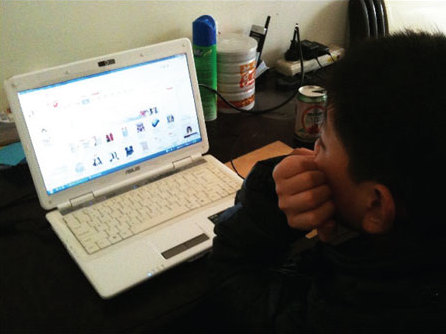Bully for you!
Updated: 2013-04-05 06:53
By Timothy Chui(China Daily)
|
|||||||||

|
A youngster surfs on the Internet with his laptop. Anonymity in cyberspace encourages incivility without fear of reprisal. |
Nearly one school kid in three claims to have been the victim of cyberbullies-malicious attacks on their character in the increasingly uncivil world of cyberspace. Fortunately Hong Kong has escaped any serious incidents thus far, but social observers see the problem escalating.Timothy Chui reports.
He was a young man who seemed in search of something - meaning to his life, perhaps. He traveled on his search through the Middle East and Eastern Europe into Greece, a journey he chronicled in a series of blog posts from May 7 to September 9, 2007.
Only recently, twenty-nine-year-old Danny Ho Hing-sang had decided to settle down - stop bouncing between part-time jobs and traveling with his girlfriend. He got a job as an IT technician at an international news agency in Hong Kong.
A couple of weeks back on a Sunday night, he sat watching television. He seemed all right as far as his family and girlfriend were concerned. But it was the last time they would see him. The next day he was found hanging at a beach in Shan Tang.
Ho left a note found by police, pointing to incidents of cyber-bullying where he had taken up employment only a couple of weeks prior.
Allegations arose that Ho had become the butt of mean-spirited comments that had circulated through emails and online - his personal details were posted along with comments ridiculing his blogs.
Ho had become the city's first fatality to the growing plague of cyber-bullying.
Locally, police do not keep any statistics about cyber-bullying and there are no laws in Hong Kong defining or governing such an act. The Privacy Commissioner for Personal Data (PCPD) has received four cases over the past five years, with three thrown out and one still under investigation.
Lawmaker Chan Kin-por believes the true number of cases was likely much higher and that the PCPD was not the most appropriate point for youths to report incidents of cyber bullying.
"I can imagine the problem will only get more serious as time goes by and other countries already have laws to stop that," Chan said.
"We need a law to spell out what can and cannot be done. That will help clarify people's rights under the law."
Teen and adult counselor Claire Young told China Daily she sees an increasing depression arising from cyber-bullying during her clinical sessions.
She said it would take a serious criminal case to kickstart legislation, as was the case overseas, but which may come too late for the potential victim or victims.
The Hong Kong government identified cyber-bullying as a growing concern in 2011. The Social Welfare Department began funding preventative and remedial programs that year, through the Boys & Girls Club of Hong Kong, Caritas Hong Kong and the Hong Kong Federation of Youth Groups.
Abuse at school
There have been plenty of incidents, like the case of Herbert, a school kid. A few weeks before Christmas he was lying in bed where he had lain for nearly two weeks, too shattered and broken in spirit to get up. He wasn't sick - not in the conventional sense. In his embattled mind, it seemed the world outside the protective four walls of his room had sickened under the influence of an evil spirit, roaming around and ready to pronounce the words of condemnation against him.
His self-confidence had been smashed under an onslaught of invective that left no doubt he was despised, belittled, held in contempt. He felt utterly crushed and anathemized after becoming the target of an endless stream of "instant messages" and acerbic barbs in online forums and in assaults on his character posted on Facebook.
That, and the daily abuse and intimidation at school made life unbearable. Herbert withdrew, mentally pulling up the covers over his head, where for a while at least he could feel safe and hidden.
The laws which protect against physical assault, slander and libel are the same laws which cover serious online attacks in Hong Kong. Legal authorities say the existing laws cover a broad spectrum and they see no need for laws narrowly focused on cyber-bullying.
The government keeps no statistics able to reveal any meaningful "outbreak" of cyber-bullying. According to the latest study, taken last year, nearly one-third of 1,507 students from primary 4 to secondary 3 were on the receiving end of cyber-bullying, according to the Hong Kong Family Welfare Society.
Most attacks took the form of online name-calling or ridicule, with just under 20 percent experiencing cyber-libel while over 10 percent of victims had naked or compromising pictures splashed online.
Incidents can snowball from an acerbic barb by a classmate into online assaults with a single victim "piled on" by many tormentors. The attacks invariably involve a wide range of slurs, insults and negative insinuations all posted online and publicly visible.
Almost anything can set off a cyber-bullying offensive. Herbert's life was nearly ruined because he fell in love with a girl in his class. She was going out with another guy. The boyfriend wasn't satisfied to be the preferred choice. He wanted this perceived challenge to his predominance avenged and set out to persecute Herbert. The bully formed a cabal, and with a group of fellow classmates bombarded Herbert with jeers and insults, ridiculing his diminutive stature, and questioning his mental abilities and sexual preference.
Another cyber-bullying case involved an out-spoken, well-groomed 15-year-old boy who enjoyed the role of online commentator about topical social issues. He was well-spoken, had a manner that was outgoing and, because of those qualities, apparently evoked the ire of some kids who had been his friends, up until that point. Now his "used-to-be" friends started calling him an attention-seeking know it all. After posting comments about unscrupulous vendors in Ladies Market, the youth discovered someone had posted his personal details on a popular local forum, the details from his Facebook profile were there, along with an appeal from the anonymous poster to other forum readers to deluge the kid with derogatory and defamatory remarks. Formerly an active online personality, the teen withdrew from his naturally open and friendly nature after accumulating more than 200 negative posts which included claims he was just an "attention whore".
Receiving such public rebukes can leave scars that remain into adulthood. The withdrawal by the victims of cyber-bullying may contribute to a life of alienation from society.
Absolute freedom online
The Internet has broken down many communications barriers, but the anonymity of online exchanges has also encouraged new heights of incivility among many users who have little fear of reprisal in airing their uncensored opinions.
The absolute freedom to say anything without having to take responsibility or face consequences become the fundamental difference when it came to online communication fostered the climate of incivility. People who normally withhold their opinions in person have no such scruples when online, according to social worker Dillis Cheung.
While victims tend to be from vulnerable groups, people who identify themselves as anything other than straight heterosexual, people with outr social views, even model students are also victimized. Ironically some of the perpetrators of cyber-bullying also are model students.
The natural herd mentality which grips most teens is amplified online, according to Hong Kong Family Welfare Society youth service manager Elvis Ng Ho-hei, who likened "liking" a cyberbully post online to passive participation.
The speed at which information spreads online has obliterated any notion of sober second thoughts from anyone responding to postings, says University of Hong Kong faculty of education assistant professor Cheung Chi-kim.
A joint 2010 study by the Chinese University of Hong Kong Department of Social Work found nearly one-third of 1,800 secondary school students surveyed claimed to be victims of cyber-bullying.
Typically the bullying involved the spreading of rumors, spread on social networking sites, according to the federation's study. Most respondents didn't see this as a problem, but as "a kind of making fun (of someone)"
There is plenty victims can do to protect themselves, social worker Cheung said.
"Youths should be wary about posting personal or contact information online, even if they are doing so to make friends," she said.
(China Daily 04/05/2013 page2)
